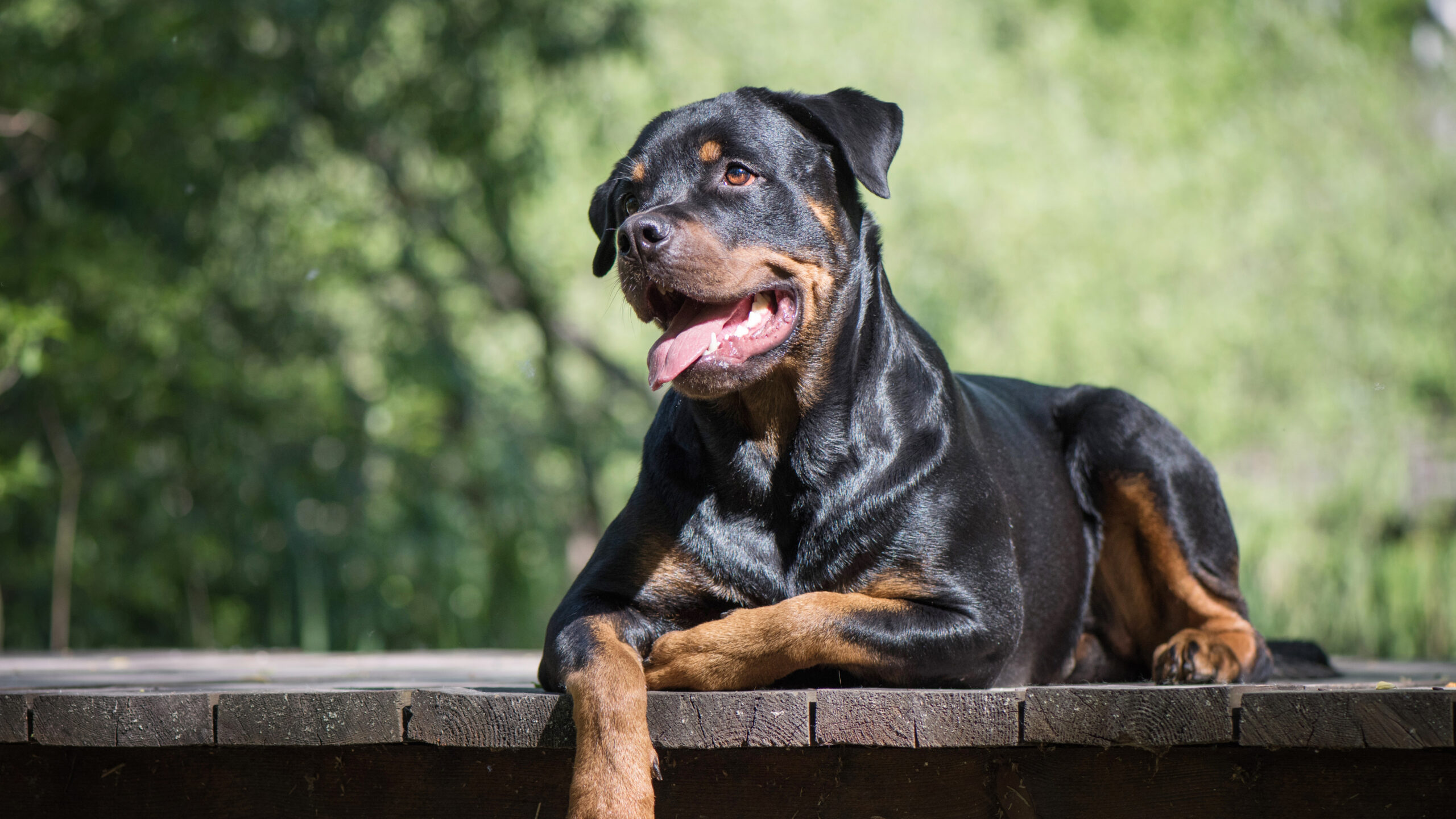Advice for Health & Wellbeing
There’s something about a Rottweiler that sets them apart from other dogs. Fiercely loyal, cuddly and intelligent, a Rottweiler is more than a household pet. They are a companion in every sense of the word. With expressive eyes, and a keen awareness of your emotions, it doesn’t take long before the rambunctious puppy you brought home becomes a lifelong friend. Every new owner wants what’s best for their Rottie, and doing thorough research right as you bring them home for the first time can give you a great deal of insight into the Rottweiler breed. What you feed your four-legged friend has a huge bearing on their health, their energy levels, and even how long they will live. With that in mind, here are a few tips to keep your Rottweiler in peak condition.
Puppy Nutritional Needs:
It’s hard to imagine that the tiny ball of fluff squirming about in your arms during the car ride home can, in just a year, become a muscular one hundred and ten pounds (49.9kg), but it’s true. Depending on the genetics of your puppy, you can expect your Rottweiler to reach between seventy-five pounds (34kg) and one hundred thirty-two pounds (59.9kg) at full maturity. Male dogs of this breed will skew towards the heavier side of this spectrum, while females will, on average, be lighter. All this growth doesn’t occur linearly. A Rottweiler puppy will put on mass in a curve. Of those first hundred and ten pounds (49.9kg), approximately seventy-five (34kg) of them will be gained in the first six months. You can expect a Rottweiler to add about twelve and a half pounds (5.7kg) of weight every month for the first six months of his or her life. After that, growth will occur at the slower rate of approximately 5 and a half pounds (2.5kg) per month.
Simply put, you can expect explosive growth in the first six months of life. This presents several nutritional challenges. To support this initial fast growth curve, a diet rich in animal protein such as fish, chicken, and beef will help build lean muscle, a strong heart and healthy organs. Rottweiler puppies require a diet with a protein percentage between 25% to 28%. This is higher than the amount of protein found in regular adult dog food. A total fat percentage between 14% to 18% will allow for healthy nerve and brain growth, supple skin, and a shiny coat of fur.
Also, a Rottweiler’s bones, unlike the bones of a medium or small breed dog, experience very rapid lengthening. The growth plates at the ends of the bones will be furiously dividing, and the bones themselves will be, compared to slower-growing dogs, less coalesced. Proper nutrition is critical to ensuring that your Rottweiler does not develop joint or bone issues that will plague it during its adult years. As a breed, and partly because of this rapid growth curve, Rottweilers suffer from hip dysplasia, degenerative joint disease, and osteoarthritis. To keep these risks at a minimum, feed a high-quality food that does not have high caloric fillers, sugars, or processed ingredients that will cause your puppy to become overweight. Do not overfeed to get your Rottweiler to grow faster. A lean, muscular Rottweiler is far healthier than an overweight one.
Adult Nutritional Needs:
There is a misconception among dog owners that dogs are carnivores. After all, dogs descend directly from wolves. Surely, they must require meat to survive. Unlike cats, which are obligate carnivores, dogs are, in fact, omnivorous. Thousands of years of co-existence with humans have altered our canine friends. Seeing a teacup chihuahua poking its head out of a lady’s handbag is proof enough. They may be related, but canines are now thousands of years removed from wolves, Rottweilers included. While cats will show absolutely no interest in your salad and if not given meat will die, your Rottweiler will gladly gorge itself on your potato crisps and show no compunction in gobbling down your sandwich; lettuce, tomatoes and all. Dogs can eat vegetables and routinely do.
Your adult Rottweiler will inform you it is constantly hungry. Don’t be deceived. To avoid health issues later on in life, keeping your Rottweiler lean and in shape is just as important for them as it is for you. Exercise is important, but no amount of exercise will overcome a diet rich in excess calories.
A proper adult diet for a Rottweiler will have from 18% to 22% lean protein. It will also have a moderate level of carbohydrates, particularly complex carbohydrates. Similar to human nutrition, higher complexity carbs are better, as they are less likely to be rapidly converted into body fat. Look for whole grains and vegetables rather than ones that have been refined into processed flours or meals. Keep in mind ingredients in dog food are listed by weight. The first five ingredients represent approximately 80% of all the ingredients in the food.
A good estimation of how much to feed your Rottweiler is to take its weight and then figure out 2% of that. The result is how much food they should receive on any day. If your dog weighs 120 pounds (54.4kg) that figures to 2.4 pounds of food (1kg) daily. Remember, treats and table scraps count.
Fatty Acid and Vitamin Supplementation:
Rottweilers fed with a quality commercial diet, either dry kibble or wet feed, should not require supplementation of fats or vitamins. Their daily food should contain all the macro and micronutrients necessary for their well-being. Rottweilers being fed a homemade diet or receiving a significant percentage of their daily intake from table scraps should receive supplementation. While it is easy to go to the store and just pick up a bottle of vitamins, your Rottweiler, if receiving supplements, should be under the watchful eye of a veterinarian. Large breeds are susceptible to overdosage of calcium and certain vitamins. Excessive amounts may cause bone damage, blood vessel damage, dehydration or other serious medical issues. A simple blood test can easily determine what supplements your specific Rottweiler requires.
Older Dog Nutrition:
Large breed dog’s age at a faster rate than small breed dogs. Your Rottweiler, being a fairly large dog, will be considered a senior several years earlier than say, a Cocker Spaniel. You can expect that by age seven, your dog will need to transition from an adult diet to a senior one.
By age seven, your Rottweiler will be metabolically slower than before. You can expect that their metabolism will be approximately 20% less than before. At this age, it is important to make sure that the diet you feed your furry friend supports an immune system that likewise is slowing down. Foods that support cardiac muscle will ensure that your Rottweiler’s heart remains strong. Quality senior foods will have elevated levels of the amino acid taurine and the fatty acids EPA and DHA. These assist with cardiac health. EPA and DHA will, also, help keep joints supple. Overall, senior diets will have a lower percentage of overall fat in comparison with adult diets. This is because older Rottweilers will have slightly more difficulty digesting them. Because of this, ensure that the food you give focuses on quality lipids high in Omega-3 fatty acids. Quality supersedes quantity.
Make sure you are watching your companion’s weight. Adjust the amount of food received accordingly. Also, if your Rottweiler is accustomed to treats from the table, do your best to give them smaller amounts, and limit what you give them to lean proteins. Your Rottweiler will still ask for constant snacks. But it’s best if you limit them to a minimum.
Allergies:
At any age, Rottweilers unlike other dogs are susceptible to allergies. It is not uncommon for Rottweilers to suffer skin allergies, food allergies, or even allergies respired from the air they breathe. Similar to human allergies, pinpointing the actual cause of what is creating discomfort may prove challenging. This is complicated because your dog may develop allergies as they age. What didn’t bother them when they were puppies may cause issues further down the road.
Be aware of your Rottweiler’s predisposition to this. Watch for signs of discomfort such as excessive flatulence, loose stools, vomiting. It is not uncommon for dogs suffering from digestive discomfort to eat grass. If you see undigested plant matter in your dog’s droppings, it might be wise to search for the causes of their discomfort.
Your veterinarian may suggest a hypoallergenic diet. If your Rottweiler suffers from any allergies, putting them on such a diet would be wise.
Nutrition as a Means of Disease Mitigation:
While it is only just beginning to gain traction in human medicine, veterinarians have long understood the link between nutrition and control of the disease. Cancers and organ diseases will respond positively if specific nutrients are withheld. For example, kidney diseases will often become easier to control if sodium chloride and other salts are kept to a minimum. Certain malignant tumours will grow faster if given carbohydrates. A Rottweiler with cancer would respond positively if switched off of a diet containing carbohydrates to one which increases protein percentages. Also, making sure your pet eats food that is highly appetising will help it as it undergoes therapy.
Do not discard advice about food formulations for specific diseases. While this is something you are unlikely to hear from a human physician, food therapies have been proven in the veterinary community to be effective. Follow your veterinarian’s guidance, and if they do not bring up the subject, be willing to ask if altering your pet’s diet will make a meaningful contribution to their disease management.
Your Rottweiler is more than a pet. It’s family. Part of the joy of life is mealtime. A good meal in the company of friends, human and otherwise, isn’t just a pleasant experience. It can be bonding and memorable to both of you. Live well, eat well.
Article from – readysetpuppy.com

